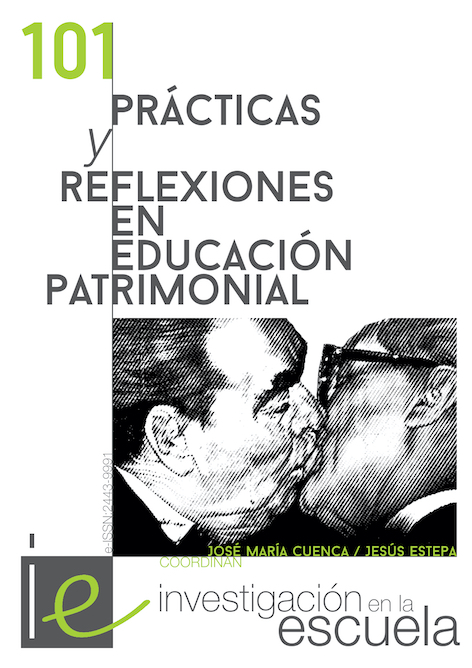Victims' testimonies in the adi-adian educational module. A view from the didactics of social sciences and heritage education
DOI:
https://doi.org/10.12795/IE.2020.i101.02Keywords:
Intangible heritage, Collective memory, Social studies, Citizenship education, Armed conflict, Controversial issues, EmotionsAbstract
This work presents a preliminary study carried out during the implementation of Adi-adian educational module in Early Childhood and Primary Education university degrees. In this module, the recent history of the Basque Country is brought closer to students through the testimony of victims. Through a registration form, data has been obtained from the participating teachers. This information has confirmed the high impact exerted by the testimonies, through which the students have known and increase their interest on the subject, encouraging a critical reflection. Besides, the possibilities it offers to work with controversial issues in initial teachers’ education and, although not explicitly addressed, emotional education has also been recognized.
Downloads
References
Arnoso, M., Páez, D., Bobowik, M. y Basabe, N. (2018). Implicaciones de los estudios sobre memoria colectiva para la enseñanza de la historia. Arbor, 194(788), a445. https://doi.org/10.3989/arbor.2018.788n2005
Bidaurratzaga, A. y Bustillo, J. (2020). Euskal Autonomi Erkidegoko Lehen Hezkuntzako irakasleen sinesmenak eta ezagutzak hezkuntza emozionalaren inguruan. IKASTORRATZA. e-Revista de Didáctica, 24, 1-15. DOI: 10.37261/24_alea/1
Bilbao, G. y Etxeberria, X. (2005). La presencia de las víctimas del terrorismo en la educación para la paz en el País Vasco. Bakeaz.
Carretero, M. (2007). Documentos de identidad. La construcción de la memoria histórica en un mundo global. Paidós.
Fontal Merillas, O. (2003). La educación patrimonial. Teoría y práctica en el aula, el museo e internet. Trea.
Fontal Merillas, O. y Martínez, M. (2017). Evaluación de programas educativos sobre Patrimonio Cultural Inmaterial. Estudios Pedagógicos, XLIII(4), 69-89.
Gobierno Vasco (2013). Módulo Educativo Adi-Adian. Aprendizajes de dignidad humana, convivencia y empatía mediante una experiencia de escucha de testimonios de víctimas. Gobierno Vasco.
Goldberg, T. y Savenije, G.M. (2018). Teaching controversial historical issues. In S. A. Metzger y L. M. Harris (Eds.), The Wiley International Handbook of history teaching and learning (pp. 503-526). Wiley Blackwell.
Gómez-Hurtado, I. y Cuenca López, J.M. (2017). Trabajar las emociones desde la educación patrimonial para atender a la diversidad del aula. En R. Martínez Media, R. García-Moris y C.R. García Ruiz (Eds.), Investigación en didáctica de las ciencias sociales. Reetos, preguntas y líneas de investigación (pp. 649-657). Universidad de Córdoba.
González, M. P. y Pagés, J. (2014). Historia, memoria y enseñanza de la historia: conceptos, debates y perspectivas europeas y latinoamericanas. Historia y Memoria, 9, 275-311.
López Facal, R. y Santidrián, V.M. (2011). Los «conflictos sociales candentes» en el aula. Iber: Didáctica de las ciencias sociales, geografía e historia, 69, 8-20.
López Noguero, F. (2002). El análisis de contenido como método de investigación. XXI Revista de Educación, 4, 167-179.
Lucas Palacios, L. y Estepa Giménez, J. (2017). Educación Patrimonial e Inteligencia Emocional. Hablan los alumnos. Clío: History and History Teaching., 43. Recuperado de http://clio.rediris.es/n43/articulos/LucasEstepa2017.pdf
Marco Macarro, M.J. y Sánchez Medina, J.A. (2008). Memoria e identidad. Una aproximación desde la psicología actual La recuperación de la memoria histórica. Una perspectiva transversal desde las ciencais sociales (pp. 53-66). Fundación Centro de Estudios Andaluces.
Marcos Arévalo, J. (2010). El patrimonio como representación colectiva. La intangibilidad de los bienes culturales. Gazeta de Antropología, 26(1).
Pagés, J., Martínez-Valcárcel, N. y Aldunate, M. C. (2014). El tiempo histórico: construcción y referentes en la memoria del alumnado. En J. Pagés, N. Martínez-Valcárcel y M. Cachari-Aldunate (Coords.), La historia de España en los recuerdos escolares: análisis e interpretación y poder de cambio de los testimonios de profesores y alumnos (pp. 229-265). Nau Libres.
Pineda-Alfonso, J.A. (2015). Educar para la ciudadanía trabajando con temas controvertidos en Educación Secundaria Obligatoria. Revista de Investigación Educativa, 33(2), 353-367.
Rana, J., Willemsen, M. & Dibbits, H.C. (2017). Moved by the tears of others: emotion networking in the heritage sphere. International Journal of Heritage Studies, 23(10), 977-988. doi:10.1080/13527258.2017.1362581
Santisteban Fernández, A. (2019). La enseñanza de las Ciencias Sociales a partir de problemas sociales o temas controvertidos: estado de la cuestión y resultados de una investigación. El Futuro del Pasado, 10, 57-79. doi:https://doi.org/10.14516/fdp.2019.010.001.002
Toledo Jofré, M.I., Magendzo, A., Gutiérrez Gianella, V. y Iglesias Segura, R. (2015). Enseñanza de ‘temas controversiales’ en la asignatura de historia y ciencias sociales desde la perspectiva de los profesores. Estudios Pedagógicos, 41(1), 275-292.
Usón González, I. (2017). Terrorismo y vulneraciones de Derechos Humanos de motivación política en el caso vasco: estudio exploratorio sobre los conocimientos y la valoración ética de la juventud universitaria vasca. Deusto Journal of Human Rights, 2, 121-148. http://dx.doi.org/10.18543/djhr-2-2017pp121-148
Wertsch, J., y Roediger, H. (2008). Collective memory: conceptual foundations and theoretical approaches. Memory, 16(3), 318-326.
Downloads
Published
How to Cite
Issue
Section
License
Authors who publish in this journal accept the following conditions:
- Authors retain copyright and grant the journal the right of first publication, with the work registered under a Creative Commons Attribution-NonCommercial-ShareAlike 4.0 International License (CC BY-NC-SA 4.0), which allows third parties to use the published work, provided that proper acknowledgement is given; the authorship of the work and first publication in AVANCES are mentioned; the material is not used for commercial purposes; and, if you create other material from the original material (e.g. a translation), you must distribute your contribution under this same licence as the original.
- Authors may enter into separate and additional contractual arrangements for non-exclusive distribution of the version of the article published in this journal (e.g., inclusion in an institutional repository or publication in a book) as long as they clearly indicate that the work was first published in this journal.
- Authors are allowed and encouraged to publish their work on the Internet (e.g. on institutional or personal websites) before and during the review and publication process, as it may lead to productive exchanges and to a wider and faster dissemination of the published work (see The Effect of Open Access).


